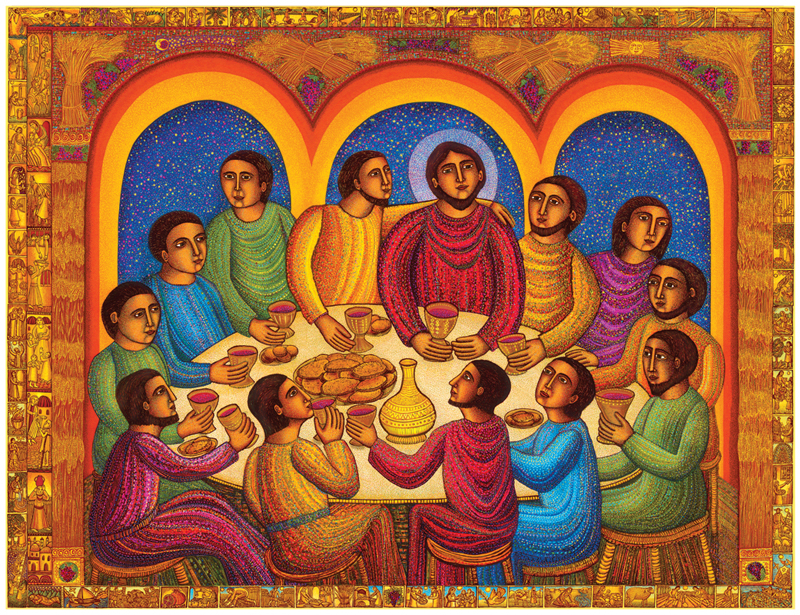Gathering at the Table in Unity? - A Holy Thursday Reflection
We have come to Holy Thursday (also known as Maundy Thursday). Now things get really busy, especially in Protestant churches, which generally get started with Holy Week observances on Thursday. Many of us will gather this evening to participate in a meal of remembrance, breaking bread and sharing the cup with the assumption that the one who died on the cross and then was resurrected is sharing this meal with us. Unfortunately, there are still many fences standing that keep us from truly celebrating a meal of unity across the Christian community. Things are better today than they once were, but it's still possible for Christians to gather and not be able to share the meal Jesus instituted. My congregation will be sharing a Maundy Thursday service with our Presbyterian neighbors. That's a good thing! I will be sharing the Word tonight (I plan to post my homily later so you can come back at 7 PM EDT to read it!). I will note the importance of unity, though I don't plan on dwelling on it.
Because we have moved into what many consider a post-denominational age, there is less urgency to address the things that divide us. They're seen as in-house issues. I understand the reasons, but until we find a way to fully gather at the Table, our work on matters of "Faith and Order" is not completed. In that spirit, I thought I might share a few paragraphs of a book written by a Disciples of Christ minister and pioneer ecumenist named Peter Ainslie. These paragraphs come from his book The Scandal of Christianity (1929). I leave you these words as we prepare to gather at the Table that Jesus set for us, not as Disciples, Episcopalians, Presbyterians, Catholics, or Orthodox, et al, but as Christians.
As you read, let me acknowledge the change in our language usage, which is not as gender inclusive as we might wish. That being noted, the word here is worth hearing and considering.
That all Christians are equal before God is significantly and beautifully expressed in the ideal of the Lord's Supper. It is a love feast of equals before God in fellowship and in partnership with the whole church. It is a pledge to the catholicity of the universal church of Christ, brethren eating with brethren in thanksgiving to Christ for knitting together the affections of mankind to the glory of God.
And yet no service in the wide range of Christianity is so awkward and ugly as denominationalism at the Lord's Supper, with some denominations denying the Supper to other denominations or refusing to partake of the Supper with other denominations, frequently as rude about it as they it were an article of merchandise to be sold or retained, according to circumstances. "Those of your denomination may have it if you will join us; otherwise we shall have to forbid your partaking it"; or it may be phrased in milder terms like this: "We would be glad to have you receive it if you will join our church.
Yet this latter phrasing is really too mild to cover the bald scandal. Every fenced-off observance of the Lord's Supper, by whatever name it maybe called, is put on a commercial basis of bargain and sale. Nowhere do falsehood and truth come together in such painful contrast as when the peculiarities of denominations are projected into the observance of the Lord's Supper, too frequently with elements of imagined superiority, which degrades the Supper, in most instances, into a purely denominational observance. The severe clashes of interpretation come like echoes from that awful morning when they quarreled around Jesus, jeered at him, and smote him with their hands.
But above the babble of these human voices arises from the presence of the Lord's Supper, as gentle as the evening dew, that crying sentence, which seems to have come out of the secret chambers of human experience, and settles down upon our consciences---"All have sinned, and come short of the glory of God." At the Lord's Supper all of us should cover our faces in shame because we have all shared in the common guilt. No human mind can sound the moral depths of the Lord's Supper, nor scale its moral heights. The clouds of Gethsemane and Golgotha hang about it, unfolding themselves, like the heavy blue-black clouds of a golden bordered sunset. But all of us can bring our penitence and prayers and self-dedication, saying of each other and of ourselves, as Jesus said of himself and us--- "For their sake I consecrate myself." [Peter Ainslie, The Scandal of Christianity, Chicago: Willett, Clark & Colby, 1929), pp. 47-49.]
It goes on from there, but if we are truly embrace the Supper Jesus established, then should we not find a way to gather at the table, not putting impediments in front of each other. Might we consecrate ourselves to this task on the day we celebrate the institution of that very meal?
*****
Picture attribution: Swanson, John August. Last Supper, from Art in the Christian Tradition, a project of the Vanderbilt Divinity Library, Nashville, TN. http://diglib.library.vanderbilt.edu/act-imagelink.pl?RC=56552 [retrieved April 17, 2019]. Original source: www.JohnAugustSwanson.com - copyright 2009 by John August Swanson.

Comments